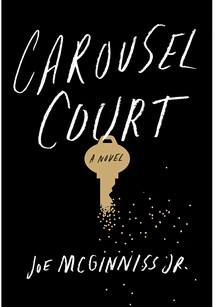


Nick and Phoebe Maguire were a young, upwardly mobile Boston couple with a new child and a promising future out West—until a job offer evaporated right before their cross-country move. When we meet them, now living in an L.A. suburb, Phoebe is a self-medicating pharmaceutical sales rep and Nick is a clean-out man specializing in "bank-sanctioned home invasions."
Haunted by an affair Phoebe can't let go of and the pills she can't stop taking, resentful of each other and chained to a house they can't afford, their marriage devolves into a vicious game of one-upmanship. And their situation becomes genuinely perilous when they both launch desperate schemes to save themselves.
The book's outlook on contemporary life is one of profound disenchantment. Consumer brand names obtrude from the page like billboards bearing the message YOU, TOO, CAN BE THIS EMPTY. In the midst of the subprime mortgage crisis, California has become the land of American apocalypse, a place where gangs prowl emptying neighborhoods in search of foreclosed houses to rob, where fire season makes the air so thick with smoke and wind and debris, it looks "like something out of Revelations."
The aftermath of the Maguires' disintegration is written in scenes so brief and quiet, so devoid of drama, they might seem unearned if they didn't feel so plainly, fumblingly human. They offer the possibility of a simple but enormous grace: that we may fail and still be loved, if only imperfectly, if only for a time.
WATCH OWN APP
Download the Watch OWN app and access OWN anytime, anywhere. Watch full episodes and live stream OWN whenever and wherever you want. The Watch OWN app is free and available to you as part of your OWN subscription through a participating TV provider.
LEARN MORE ABOUT THE WATCH OWN APP >NEWSLETTERS
SIGN UP FOR NEWSLETTERS TODAY AND ENJOY THE BENEFITS.
OPRAH IS A REGISTERED TRADEMARK OF HARPO, INC. ALL RIGHTS RESERVED © 2024 HARPO PRODUCTIONS, INC. ALL RIGHTS RESERVED.
OWN: OPRAH WINFREY NETWORK